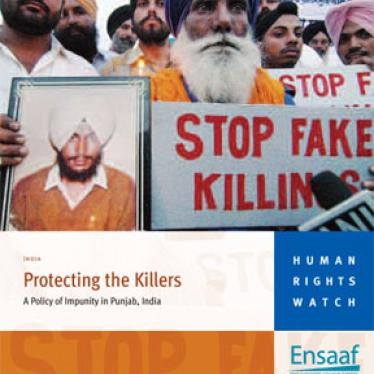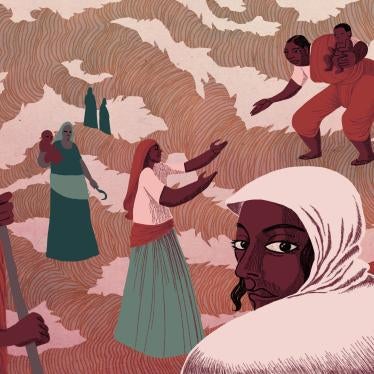To the European Union:
We urge you to use the occasion of the EU-India summit on November 30, 2007 to increase your engagement with the Government of India on human rights issues. We believe that a dialogue built on mutual respect should involve not just economic concerns but also improvement of India’s human rights record. This is important for the people of India, for India’s neighbors, and for the developing world, given India’s significance as a role model, and as a military and aid donor.
In order to help the dialogue with India at the EU-India Summit, Human Rights Watch highlights the following areas of particular concern:
Impunity
There is a high level of violence perpetuated by police and the armed forces in India. Police and armed forces engage in extrajudicial killings, “disappearances” and torture, especially during counter-insurgency operations. Impunity occurs because there are laws that make it extremely difficult to prosecute officials for such acts and there is reluctance by the government to hold its officers accountable. In particular, police and paramilitary forces are protected under Section 197 of the Criminal Procedure Code, which provides that no court will recognize any offence alleged to have been committed by a public servant (including a member of the armed forces) in the discharge of official duty without the express sanction of the federal government. Permission to prosecute is rarely granted, even when an investigation reveals strong evidence of human rights violations. The army is provided with additional immunity when they are deployed in areas of internal conflict under the Armed Forces Special Powers Act, such as Jammu and Kashmir and the Northeast. Under this Act, no prosecution, suit or other legal proceeding shall be brought, except with the express sanction of the federal government against any person regarding anything done or purported to be done in exercise of the powers under this Act.
The EU should urge the government of India to repeal all legal provisions providing effective impunity to government officials such as Section 197 of the Criminal Procedure Code and the Armed Forces Special Powers Act.
Religious Intolerance
The rise of Hindu nationalism has posed new challenges to India’s constitutional commitment to secular democracy. The policies espoused by India’s Bharatiya Janata Party (BJP) and its sister organizations, collectively known as the sangh parivar, have already resulted in much violence against the country’s minority populations.
A number of attacks occurred on places of religious worship in 2007, including a bomb blast at the revered Sufi shrine in Ajmer in October. A number of people have been killed in indiscriminate bomb attacks blamed on Islamic groups in Mumbai, Hyderabad and most recently in Uttar Pradesh state. The current Congress party led coalition government has succeeded in preventing communal riots following such attacks.
However, the Indian government has failed to prosecute most of those who instigate or participate in religious mob violence. Muslims have been targeted in mob violence in which State forces were complicit and even the perpetrators of violence, such as the Gujarat riots in 2002. Muslims furthermore face endemic discrimination when they seek employment or even wish to lease or purchase property. When a bomb attack happens and Muslim groups are blamed, such as in Mumbai in 2006 or Hyderabad in 2007, police have arbitrarily detained scores of young Muslim men and subjected them to torture during interrogation.
Hindu extremist groups have attacked Christians, including killing priests, raping nuns, and destroying Christian institutions, schools, churches, colleges, and cemeteries in states such as Madhya Pradesh and Gujarat. Several state governments have adopted anti-conversion legislation to prevent what they claim to be coerced conversions by Christian missionaries.
The European Union should recommend to the Indian government that they prosecute those responsible for religious violence and undertake a review of legislation and practices that violate the right to freedom of religion provided by the Indian Constitution and under international law.
Discrimination against marginalized groups
India has made significant economic advances, however many people have been left behind. Despite legislative measures to protect marginalized groups, discrimination based on caste, religion and gender continues to be widespread in practice. Local police often fail to implement laws set up to protect Dalits and adivasis (members of tribal groups). As a result Dalits and adivasis are denied their basic civil rights, discriminated against, denied access to land, forced to work in degrading conditions, and routinely abused at the hands of the police and of higher-caste groups that enjoy the state's protection. Women remain highly vulnerable to abuse, both inside and outside the household.
While Indian law calls for affirmative action in government jobs, with increasing privatization, it is crucial for the European Union to encourage European companies operating in India to adopt equal opportunity policies that benefit Dalits, adivasis, women and religious minorities.
The European Union should urge the Indian government to implement measures designed to ensure that states abolish the practice of “untouchability,” in compliance with Article 17 of India’s constitution, ensure strict implementation of the Scheduled Castes and Scheduled Tribes (Prevention of Atrocities) Act, 1989, and of laws to protect women including recent legislations aimed at ending domestic violence, sexual harassment in the work place and trafficking.
Role in the region
As an emerging economy with increasing influence in global affairs, India is demanding greater diplomatic clout, including a permanent seat at the UN Security Council. Although it is currently a member of the Human Rights Council, India has failed to encourage better human rights practices in its neighboring countries where it has influence.
For instance, despite the brutal crackdowns on peaceful protestors in Burma, India has failed to use its military sales and business dealings with the junta to press for accountability and respect for human rights standards. The EU should encourage India to pressure the Burmese regime into ending human rights violations, begin constructive dialogue with democracy activists and support efforts of the international community for targeted sanctions on members of the repressive junta.
The EU should also urge India to publicly support a UN human rights monitoring mission to Sri Lanka to conduct impartial investigations and prevent human rights violations by both government forces and the Liberation Tigers of Tamil Eelam.
India should be urged to play a more positive role in encouraging the government of Bhutan to end discrimination against its citizens of Nepali origin and allow the proper repatriation of refugees who have remained in camps in Nepal since the early 1990s.
We believe India’s potential as a leading global power would be enhanced and strengthened by an explicit commitment to human rights. We request the EU to highlight these issues at the upcoming summit.
Sincerely,
Brad Adams
Executive Director
Asia Division
Human Rights Watch







